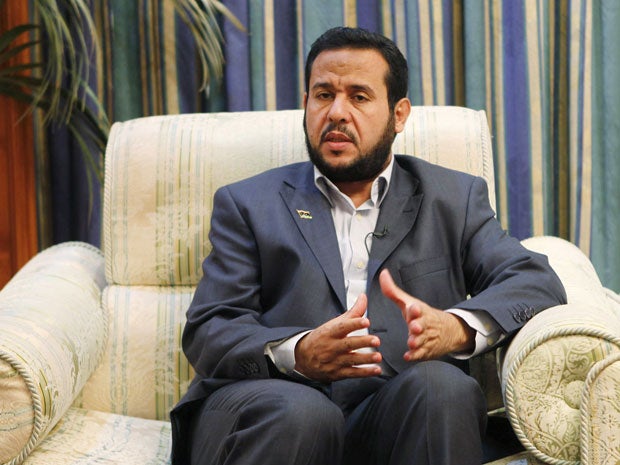Police launch probe over torture allegations in Libya

British spies accused of helping in the rendition and torture of two Libyan rebels will be investigated by police, officials said today.
Scotland Yard launched the criminal inquiry after saying the allegations were so serious that they must be investigated immediately and could not wait for an official inquiry into British complicity in torture.
Lawyers for the two Libyans, who are planning legal action against the Government, called for their claims to be investigated "promptly and comprehensively".
Sami al Saadi, an opponent of Muammar Gaddafi's regime, and Abdel Hakim Belhadj, one of the leaders of anti-Gaddafi forces, allege British spies were complicit in their rendition and ill-treatment in 2004.
Mr Belhadj, 45, a Libyan rebel commander living in exile in Beijing, says he was tortured after being detained with his wife in 2004 en route to the UK where they were trying to seek asylum.
Also known as Abu Abd Allah Sadiq, Mr Belhadj was held for six years in prisons in Libya, and claims he was interrogated by "foreign" agents, including some from the UK.
His wife was also imprisoned in Libya for four months, then released just before she gave birth, they say.
Lawyers claim evidence of the UK's role in the couple's rendition is detailed in a number of documents held by the Libyan security services, which came to light after the fall of the Gaddafi regime.
One is a thought to be a letter from Sir Mark Allen, former director of counter-terrorism at MI6, to Moussa Koussa, head of Gaddafi's intelligence agency, dated March 18 2004, according to claims made by the lawyers.
In it, Sir Mark is said to pass on thanks for helping to arrange Tony Blair's visit to Gaddafi, writing: "Most importantly, I congratulate you on the safe arrival of Abu Abd Allah Sadiq.
"This was the least we could do for you and for Libya to demonstrate the remarkable relationship we have built over the years."
Mr al Saadi, also known as Abu Munthir, has made similar claims, saying he was stopped along with his wife and four young children when he was flying to the UK from his home in Hong Kong in 2004 and taken to Tripoli.
The 45-year-old, who was a member of LIFG (Libyan Islamic Fighting Group) which was fiercely opposed to Gaddafi, said that after the tyrant's overthrow documents were discovered showing British personnel were instrumental in his detention and rendition.
Solicitors Leigh Day & Co, representing both men, said: "Our clients and their families' lives have been irreversibly affected by the crimes committed against them by the Gaddafi regime.
"There is substantial evidence of collusion in torture by British security services with the knowledge and express approval of UK ministers. These serious allegations of crime must now be investigated promptly and comprehensively."
The latest allegations are "so serious that it is in the public interest for them to be investigated now" rather than at the end of the planned inquiry by Sir Peter Gibson into similar claims, the Director of Public Prosecutions Keir Starmer QC and Metropolitan Police Assistant Commissioner Lynne Owens said.
It came as police and prosecutors announced that no charges would be brought against British spies over their alleged complicity in the torture of former Guantanamo Bay detainee Binyam Mohamed or another individual held at Bagram Air Base in Afghanistan.
Mr Mohamed, who was held in Pakistan between about April and July 2002 and elsewhere between about July 2002 and early 2004, said he had not expected any charges to be brought against the MI5 officer involved in his case.
But he added that any wider criminal investigation would show a "pattern of massive complicity by UK bodies in criminality at the highest levels".
Mr Starmer said that while evidence showed that British security services provided information and questions to the US, there was not enough evidence to prove they did it while they "knew or ought to have known that there was a real or serious risk that Mr Mohamed would be exposed to ill-treatment amounting to torture".
In the second case at Bagram Air Base in January 2002, which was referred by MI6 itself, police and prosecutors were unable to speak to the detainee or possible witnesses, who were not British officials, leaving them with insufficient evidence to bring charges, Mr Starmer said.
MI6 chief Sir John Sawers said the move "allows the courageous individual at the centre of the investigation to continue his work in support of national security".
He added that it was in MI6's interest to deal with the new allegations "as swiftly as possible so we can draw a line under them and focus on the crucial work we now face in the future".
Foreign Secretary William Hague has also stressed the Government's desire to "draw a line" under the allegations, but the latest investigation will delay the possibility of that happening.
Human rights groups and campaigners said the lack of charges made the need for an inquiry greater than ever.
Deputy Prime Minister Nick Clegg said the Government "condemns torture and inhumane treatment" and will never support it or ask others to do it.
Referring to the latest claims, he added: "The Government and the security services will give complete and full cooperation to those investigations so that the police can get to the bottom of them as well."
PA
Bookmark popover
Removed from bookmarks